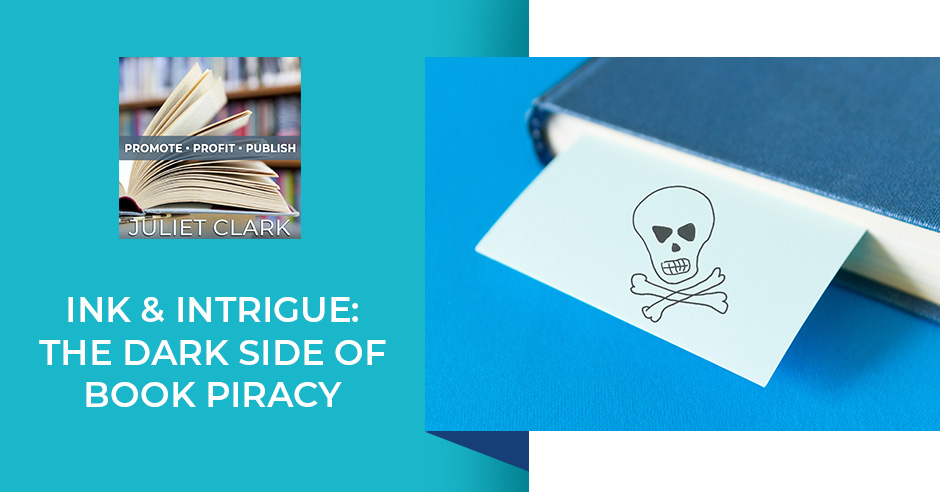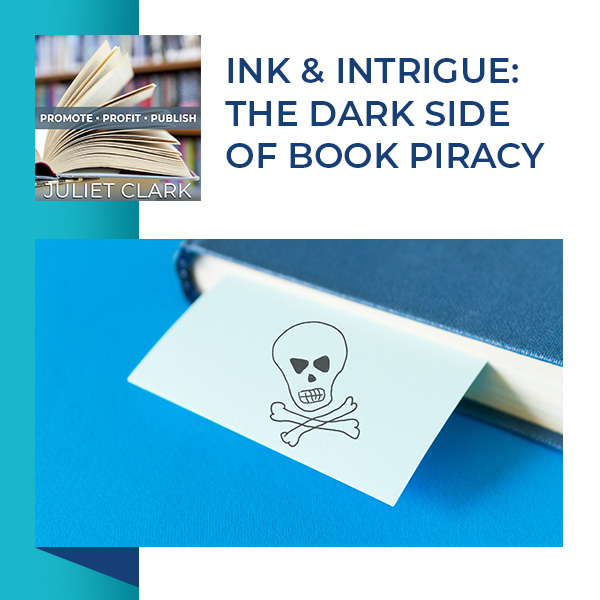
Book piracy is a serious issue that robs authors of their hard-earned work and rightful income. It’s not just a matter of lost profits; it’s a violation of the creative spirit and a threat to the future of literature. In this informative episode, host Juliet Clark delves into the pressing issue of piracy in the world of publishing. The discussion explores the various forms of piracy, its impact, and proactive measures to mitigate risks. From understanding the importance of copyright to identifying illegitimate distribution channels, Juliet offers valuable insights for creators to safeguard their work and maintain control over their content. The episode also emphasizes the broader implications of piracy on both individuals and brands, underlining the necessity of vigilance in an era of evolving digital threats.
—
Watch the episode here
Listen to the podcast here
Ink & Intrigue: The Dark Side Of Book Piracy
The Problem of Book Piracy
It’s just me here to talk about a serious problem going on in the book world and, hopefully, how you can take precautions to avoid it. Before we get started, I want to remind you to run over to Breakthrough Author Magazine. You can find it at www.BreakthroughAuthorMagazine.com. Our theme for 2024 is Ditch the Middleman Strategies for Bypassing Book Distribution Fees.
For those of you who don’t know, you have to pay the book distributor 55% of the retail price. Once you do that, there’s not much profit left in that book for you. We’re going to do a deep dive in 2024 on how to sell those books without the distributors. For those of you who are expert businesses, this is an excellent way to build personal relationships. Stay tuned and get yourself subscribed. This is the book marketing end of this, not the platform building, but getting your book out there and marketed.
—
We’re going to talk about piracy in the publishing world. There’s a lot of it going on. Typically, up until about 2020, when COVID hit, we started seeing more online corruption or theft. I have a little bit of credit card theft. Somebody used one of my credit cards. When I talked to the credit card company, they said they’ve been seeing an enormous amount since COVID, since more people went online.
Before that, I remember being in New York City back in probably the early ‘90s down in Chinatown. There was a place where they were distributing bootleg movies. In the past, this has been more of something that took place in the movie industry. You’ve probably seen it on almost every TV and movie that you’ve seen in a long time. You’ve seen those warnings at the beginning.
The same thing is true for books now. As books have moved online, so has the online scamming. What do we mean when we talk about piracy? What we’re talking about is unauthorized distribution, theft of your intellectual property, and reproduction of it without your permission. It’s copying, someone performing it, storage, and somebody else selling what is yours and what is your intellectual property.
We have seen a little bit of that in the book industry in the recent past, besides the overwhelming amount that’s happening now. We’ve seen a little bit of it in the foreign rights area, the scams where people call you and say, “We want to produce your book in Russian. You get paid to do it.” They take your material and you don’t have a lot of say over it. I want to talk about not only that but piracy in the digital age because there’s so much of it.
The first thing you need to know about this is that going through normal distribution channels will help you avoid it a little bit more. I know that Amazon will scan all the material when it goes in. They can see if there are duplicates under different names. I have to tell you that several years ago, someone came to me and they were part of a brand new program where they gave them an eBook to sell the materials, and they wanted to publish the book.
I had to send them back and ask, “Can you do that because you don’t own the rights to that book?” It turned out that the answer from the company who gave it to them was no. They could go to a personal printer, print it for their own personal consumption, and hand it out to their clients, but they couldn’t publish the book.
The first thing you need to know is to understand what your copyright rules are and making sure that your book is copyrighted. That is one of the things that can protect you. Somebody told me this a long time ago. I said, “You can’t do that with books.” It used to be in the music industry that you could mail your music to yourself or your song, whatever you were writing. That would be considered copywritten. You can’t do that with a book. You need to go onto the Library of Congress copyright, do the paperwork, and get that certificate.
Understand what your copyright rules are and make sure that your book is copyrighted. Share on XMy understanding is if you don’t do that and someone steals your work, you’re not even going to get looked at in court. Any attorney will tell you, “You had to file that paperwork to copyright it.” One way you can avoid some of this copying is to be on platforms that are standard distribution platforms. That would include Amazon, Apple Books, Google Books, and places like that. Make sure when your book is distributed and you get it published, that you are with distribution platforms that are legitimate.

Book Piracy: One way you can avoid some of this copying is to be on standard distribution platforms.
A lot of this happens on platforms that aren’t legitimate. Some of the illegal sites that do this are what we call phishing sites. You’ve probably heard that because there’s a lot of email phishing that’s going on now. People that have direct out downloads and also something called torrents. There are a lot of advances in the industry, but you need to be able to understand the publishing platforms that are out there.
There are three main ways to get your book published. The eBook stores, which I mentioned, three are fabulous. Subscription services, which are a little bit more towards the Audible. Audible would be something. I have a subscription with Audible. I’m not even sure you can go and randomly write or buy a book there. I have a subscription. Every month, I can choose many books from there or print on demand.
These are all different business models. They’ll enable customers to find you more easily in legitimate ways. That’s one way. Understanding the publishing when you publish your book is a great way to protect yourself from ending up on platforms where piracy isn’t completely legal. Even with those business models, there is some piracy that remains. If you think about those different business models, it’s fairly easy for a subscription service like Audible to record, distribute, and have that book distributed on a non-legal platform.
That’s what happened when I saw the movie in New York City. We bought one. When we got it home, we stuck it in the VCR. You could tell that someone was in the movie theater. It was this little bitty screen. They were taping it while they watched the movie and reselling it. I would imagine with something like Audible, that would be easy.
I’m not saying Audible is bad. I love Audible, but I could see you listening on one computer and recording on another. It would be easy to pirate that way. Some places where piracy goes on that you can avoid and make sure that your books are not on there are file hosters, torrents, and blogs sometimes. People will steal the material and put it on blogs, especially if it’s something like poetry, short stories, or streaming platforms. It’d be easy to get on YouTube and read somebody else’s book or create something around somebody else’s book. Make a video like I’m doing now. This is not only a blog, but it’s a video. It would be easy to get on there and do something that violates the copyright of that book.

Book Piracy: Sometimes people will steal the material and put it on blogs, especially if it’s something like poetry or short stories.
e-Commerce is where so much of this is happening, the piracy and the counterfeiting that goes on eBay. I have to tell you guys. I’ve bought things on eBay that I didn’t understand at first that I was buying copyrighted material. Here’s what happened. I went over and looked over, thinking I could get somebody’s book cheaper on eBay. What I got was a downloaded program.
In that case, it was something that someone had put together. It was one of those programs that are a do-it-yourself. Someone downloaded it. After they finished with it, they uploaded it and resold it themselves. There’s a significant amount of stuff I bought before I realized what was going on there. You have to watch that your book doesn’t end up on eBay. Your materials go and create a course. That doesn’t end up on eBay.
You need to be a little bit vigilant about what’s over there and what’s being sold. I got those programs for $50. I got a couple of them that those people were selling for $3,000 to $4,000 when I went and looked online when somebody brought it to my attention. That was what was going on. Phishing sites go and hijack your traffic. They can also be a way that they grab onto your audience.
We had something happen on a livestream back in August where there was a new AI software that was supposed to be listening. It was like those ones that showed up at the Zoom meeting before the recording. That’s another way your stuff can be pirated. We had one that interfered with the Zoom recording of the program.
When we went and looked up online what it was, we went back to the person who attended the event and said, “It says online that this particular program can send out emails to your audience.” Somehow, it gets into your email. You have to be careful what you use out there because you could be accidentally pirating somebody else’s information.
I recorded an episode. The person that I was interviewing had Fathom. She forgot to turn it off. I had to ask her and say, “This is my copyrighted material. Could you please turn that off before we get going?” She wasn’t trying to do anything. She has it there to take notes, which I think that’s what most people use. That’s software on Zoom. You have to be careful if you’re creating Zoom classes that people aren’t copying your work because there’s a lot of that out there that happens.
Why do people pirate? It’s to make money, but they do it because there’s a lack of money available. They do it because they don’t have a credit card available to buy the material. They’re not willing to purchase content when they get it for free. We had a discussion about that in one of our group programs that I’m a part of. You turn on something like Fathom, or you have a friend do it. All of a sudden, you and all of your friends are taking the same class that only one of you has paid for.
They’re not willing to buy a subscription or upgrade. That’s when you can get into trouble. They’re not happy with their own content offering. This happens a lot with courses that get pirated. A lot of you are creating courses from your book. That’s when the Fathom shows up or one of those programs that can record what you’re doing. I know people in my programs. We record using that information or selling that information. I don’t feel like any of my clients would ever do that, but you never know when it’s going to happen.
It is when the content isn’t available on legal channels. You can find your stuff on the dark web sometimes. For those of you who have credit monitoring, every once in a while, you will get an alert that says somebody has your email or password. It’s the same thing. There’s been phishing happening. They’ve pirated something. They’re trying to get in and steal your information.
You’re wondering, “They’ve stolen my information. What are they going to do with it? How are they going to monetize it?” One of the biggest things is ad revenue. I’ve got or seen ads that I click on. I know that ads are not going to the person that I know who is selling that material. This happens a lot on places like Facebook and Google, where you create an ad and you sell something that’s not yours. Downloads affiliates, memberships, and phishing scams.
I want to go back for a minute to memberships because I see this a lot. People who have membership sites, especially if they’re based on your book, make sure that you’re dripping your content because I don’t know how many times I’ve heard that there’s this whole library of content. If you subscribe and people will subscribe for one month, they’ll download all your content and cancel. They’ve gotten everything that they should have gotten over a year-long subscription. Be sure when you put that together, especially if it’s based on the material in your book, that you drip that content. You only let so much out a month. We’re seeing that more with the subscription models that are out there.
The phishing scams are everywhere these days. I can’t tell you how many times I get an invoice. I look at it before I open it. Most of the time, I don’t open it. It’ll say it’s an invoice. I’ll look at who it’s from. You can click on that email. I get this a lot with Microsoft. It’ll tell me I need to change my password. I’ll click on the actual email and see it’s like Joe’s Garage down on Fifth Street or something. Microsoft is not going to send you a password reset from something like that. You do have to be careful.
Here’s another thing you have to be careful about out there. It is catfishing. I’ve seen so much catfishing. I’ve been talking to a lot of people about it. I know this doesn’t apply to books, but if you’re on a dating app, somebody will want to get your email right away. They’ll threaten you, send you nude pictures, and say that they’re going to tell everyone you are looking at nude pictures, pornography, or underage. You need to be careful with all of those phishing scams because sometimes it’s not phishing to get the password. Sometimes, it’s more devious than that and can be bad stuff. You have to be careful with all of that stuff.
The next thing is, how does this affect you? How does this affect publishers? It doesn’t affect publishers because authors get their royalties from the publishers. If there’s free material out there, both of you are not getting paid in most cases. Before buying the book, most people look around and see if they can get it for free someplace. Unless you’re doing some free book on Amazon, you may not be safe. You can enroll in the KDP Program if you don’t have your book in multiple places. You can give your book away for free for five days.
Before buying a book, most people look around to they see if they can get it for free someplace. Share on XThis is especially good for fiction books. I can tell you back when I used to write fiction, I made a lot of money off that. I had a bestseller from a KDP five-day free that took off, and I had tremendous book sales after that because people started noticing. They bought it. That was where I made over $25,000 on that one particular fiction novel. Don’t use free services unless they’re legit. I would say the only free site I know out there that is legit is Amazon. If you have your information on your website, they have little octopus arms that go out to see if there are other areas where that book is. They check.
Types and Impact of Piracy
The bestselling search for your bestselling titles on places like Google. When I look on Google, I have pages of books. Check and look at those books and see how they are selling your books. Are they legitimate bookstores? Are they websites that may be downloading it and selling it at a discount? Do that every once in a while. Check every couple of months.
Google yourself or your book and look at all the places on there that sell. A lot of them are legitimate. They’re mom-and-pop bookstores. They’re saying, “We have the book.” Look at the pricing. Look to see if it’s free or discounted. If it’s discounted, it’s less than 55% because chances are a lot of those on there are not legitimate sales of your book.
There’s also the author relations. You can’t prevent all this, but make sure that you do have access to your publisher if you find something because they can give you the skinny on what’s going on when they look at it. Sometimes, they can go back to the distributors. They know how to look at these things. That doesn’t mean they’re always going to catch people. In fact, I would say we rarely catch people doing that.
I had a conversation with someone in the law enforcement arena about some of these piracy issues. They legitimately told me most of them go back to Russians. There’s a good chance you’re not going to get your money back, but you might be able to get a site shut down. A few things to consider about all this are your legal costs, what is the impact on your brand, and will things like that diminish your customer loyalty.
A lot of times, it’s not only to avoid the 55% but to avoid piracy. I would sell your book right on your own site. That will give you a connection to your customers and also the chance to build a relationship and cut down on piracy because they’re going to be paying through a secure pay portal. You will have an email, address, and name. You can do a one-time-only offer and give them something free with it. At the end of the day, everything is secure.
Some examples of piracy in publishing that you’re going to see are the search engines. They’re full of illegal links. Google, look at all the links and see what’s going on in the search engines. I would say Google is probably the biggest because it is the biggest search engine. Start there with the search engines.
You can also be concerned when you find phishing links in your email. If there are inquiries about your book, make sure that you are looking there and look before you open it because some of the stuff has viruses in it. Check eBay frequently because you can find your downloads there. What happens is it’s not the book because anybody can resell a book. There’s nothing wrong with that. There is something wrong with it, but not as bad as the download problem.
I bought a couple of courses online before I realized what was going on and didn’t understand. Understand the data. You need to litigate this. You need your copyright certificates. You need stuff like that to be able to do it. Ingram is offering, and most of you are published through Ingram. They don’t necessarily have it on Amazon.
I’m not sure about that, but I know Ingram Lightning Source, the distribution channels that we personally use, have a product called Link Busters that offers industry-leading anti-piracy solutions for publishers. Make sure when you hire a publisher that you’re hiring somebody who has access to something like that because you want to protect your intellectual property as much as humanly possible.
I hope that was helpful for you guys. I know that was a lot of information, but you need to know what’s going on and how you can minimize this for your intellectual property. All of you guys have great ideas. You have things that need to be protected, but you also need to be aware of how to protect yourself in the process.

Book Piracy: You have things that need to be protected. But you also need to be aware of how to protect yourself in the process.
If you’re protecting yourself in this area, protect your financial areas. I’m not making any money from this. I have the FICO app. The FICO app tells me everything. It’s up to the minute FICO scores. It tells you when things have gone down or gone up. You can see who’s accessing your account. It doesn’t hurt in this day and age to have something like that where you can check or be notified. There are a lot of programs out there that will notify you when there are financial changes. It doesn’t hurt to get those, especially based on what I told you about.
Protecting Your Intellectual Property
I had a conversation with one of my credit card companies. Someone used my credit card for TikTok. I don’t even use TikTok. I have strong feelings about why I don’t use it. When I saw that on my credit card, I had a conversation with them, and the woman who was in their fraud department related that since COVID, they’ve had an extraordinary amount of fraud and you don’t ever want that to happen to you. It’s a pain. I hope that was helpful. You guys hit the reply button. Go over on YouTube. Watch this and comment on it. I hope that all of you protect everything you’ve done because you deserve to have the best publishing journey possible. Thank you. See you next episode.
Important Links
- www.BreakthroughAuthorMagazine.com
- YouTube – Superbrand Publishing
Love the show? Subscribe, rate, review, and share!









Leave A Comment